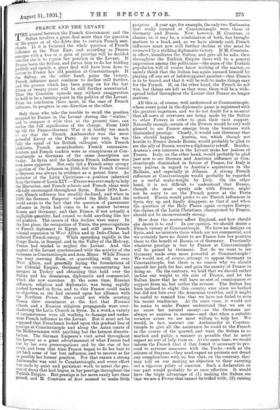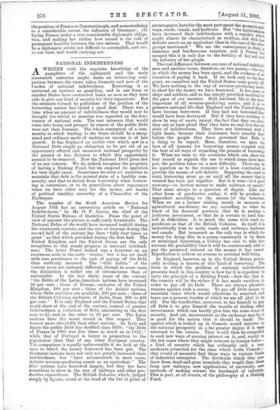FRANCE AND THE LEVANT. T io quarrel between the French Government
and the Sultan involves a great deal more than the question of the quays or of the debts due to certain French mer- chants. In it is focussed the whole question of French influence in the Near East, and according as France emerges with a loss or a gain of prestige will be decided whether she is to ree-ain lier position in the Levant. If France beats the Sultan, and forces him to do her bidding publicly and openly, a great deal will have been done to restore to France her old position at Constantinople. If the Sultan, on the other hand, gains the victory, French influence must continue to decline still further, and the process which has been going on for the last fifteen or twenty years will be still further accentuated. Thus the Constans episode may without exaggeration be held to be a, turning-point in the politics of the Levant. From its conclusion there must, in the case of French influence, be progress in one direction or the other.
Only those who take the trouble to recall the position occupied by France in the Levant during the " sixties," and to compare it with that at the present time, can realise the full significance of the change. From 1860 up till the Franco-German War it is hardly too much to say that the French Ambassador was the most powerful Envoy at the Porte. At any rate, he was fully the equal of his British colleague, while French architects, French moneylenders, French concession- hunters, and French traders were as conspicuous at Con- stantinople as Germans of the same description are b-day. In Syria and the Lebanon French influence was even more apparent. Not only did a French army occupy a portion of the Lebanon in 1866, but the French Consul at Beyrout was always in evidence as a potent force. As protector of the Latin Christians—a position inherited from the times of Louis XIV.--Franc,e was ever ready to help the Maronites, and French schools and French ideas were officially encouraged throughout Syria. Since 1870, how- ever, French influence has steadily declined, and when in 1898 the German Emperor visited the Holy Land the world awoke to the fact that the question of paramount influence in Syria had come to be a matter between Russia and Germany, and that France, if not actually a negligible quantity, had ceased to hold anything like her old position. The causes of this decline were many. In the first place, the occupation of Tunis, the preoccupations of French diplomacy in Egypt, and still more French colonial expansion in West Africa and in Indo-China„ had deflected French energy. While spreading rapidly in the Congo Basin, in Senegal, and in the Valley of the Mekong, France had tended to neglect the Levant. And this neglect of the Levant synchronised with the activity of the Germans in Constantinople and Asia Minor. While France was busy coercing Siam, or quarrelling with us over West Africa, and generally laying the foundations of her Colonial Empire, Germany was concentrating her energies in Turkey and obtaining that hold over the Sultan and his dominions, diplomatic and commercial, which she now exercises. At the same time, Russian influence, religious and diplomatic, was being rapidly pushed forward in Syria, and to this France could make no objection, as she had entered upon her alliance with the Northern Power. She could not while courting Russia show resentment at the fact that Russian schools and a Russian religious propaganda were over- shadowing the Latin Church in Syria. In a word, a variety ofcircumstances were all working to damage and under- mine French influence in the Levant. But it must not be supposed that Frenchmen looked upon this gradual loss of prestige at Constantinople and along the Asian coasts of the Mediterranean with anything but the keenest dissatis- faction.. The German Emperor's visit acted throughout the Levant as a great advertisement of what France had lost by her own preoccupations and by the rise of her rivals, and from that time France began to do her best to get back some of her lost influence, and to recover as far as possible her former position. For that reason a strong Ambassador was sent to Conitantinople,_ and every effort was made by quiet and persistent -work to arrest the pro- cess of decay that had begun in her prestige throughout the Turki411 Empire. But prestige is far more easily lost than B'aMed, and M. Constans at first seemed to make little progress. A year ago, for example, the only two Embassies that really counted at Constantinople were those of Germany and Russia. Now, however, M. Constans, or chance, or, it may be, a combination of both, has brought matters to a head, and, as we have already said, French influence must now still further decline or else must be recreated by a striking diplomatic victory. If M. Constans, in effect, humiliates the Sultan, and gets all he asks, then throughout the Turkish Empire there will be a general impression among the politicians—the mass of the Turkish population will of course know nothing of the matter, or merely think that the Sultan has again amused himself by playing off one set of infidels against another—that France is to be feared, and that it will be well to make things easy for the French. If, on the other hand, the French do not win, but things are left as they were, there will be a wide- spread belief throughout the Levant that France no longer matters.
All this is, of course, well understood at Constantinople, where every point in the diplomatic game is registered with the greatest eagerness, and we do not doubt for a moment that all sorts of overtures are being made by the Sultan to other Powers in order to gain their tacit support. Naturally enough, certain of the Powers would be very well pleased to see France emerge from the business with diminished prestige. Clearly, it would suit Germany that this should happen. Austria, too, which though not hostile to France dreads Russia, would probably be glad to see the ally of Russia receive a diplomatic rebuff. Besides, Austria's own interests in the Levant make her jealous of France. Italy, on the other hand, would probably be glad just now to see German and Austrian influence at Con- stantinople diminished in favour of France, for Italy is very jealous in regard to Austria's aspirations in the Balkans, and especially in Albania. A strong French influence at Constantinople would probably be regarded. as a useful make-weight by Italy. On the other hand, it is not difficult to understand. that Russia, though she must openly side with France, might not be sorry to see the French power at the Porte reduced. Russia would prefer to see French influences in Syria dry up and finally disappear, so that if and when the question of the Holy Places again occupies Europe, the claims of the Latin Christians, championed by France, should not be inconveniently strong.
How does the matter affect England, and how should she desire it to end In our opinion, we should desire a French victory. at Constantinople. We have no designs on Syria, and no interests there which are not commercial, and we certainly have no desire to see France lose her position there to the benefit of Russia or of Germany. Practically whatever prestige is lost by France at Constantinople will be gained by Germany. But do we want to see Germany made even more powerful at Constantinople ? We would. not, of course, attempt to oppose Germany in Constantinople, but there is no reason why we should smooth her path for her, and gain the enmity of France in doing so. On the contrary, we hold. that we should rather incline our weight to the side of France, and let the Sultan know that he will have no sort of countenance or support from us, but rather the reverse. The Sultan has been inclined to slight this country ever since we barked but did not bite over the Armenian troubles, and it might be useful to remind him that we have not failed to note his recent tendencies. At the same time, it would not be amiss to make France understand that we are in no sense her natural enemy—as the Germans are always so anxious to assume—and that when a suitable occasion arises we are most willing to help her. We would, in fact, instruct our Ambassador at Constan- tinople to give all the assistance he could to the French in the course of the quarrel, and warn the Sultan in as marked and public a manner as possible that he must expect no sort of help from us. At the same time, we would inform the French that if they found it necessary to pro- ceed to extreme measures with the Turks—such as the seizure of Smyrna—they need expect no protests nor dread any complications with us, but that, on the contrary, they may rely on our making no objection to their carrying out a vigotous policy of coercion. Such a declaration on our part would probably be at once effective. It would hay.. the triple advantage of (1) making the Sultan see that we are a Power that cannot be trifled with; (2) raising the position of France at Constantinople, and soneutralising to a considerable extent the influence of Germany ; (3) laying France under a very considerable diplomatic obliga- tion, and making her realise how unreal is the talk of permanent hostility between the'two nations. That would be a diplomatic stroke not 'difficult to accomplish, and one, in our view, well worth carrying out.



































 Previous page
Previous page